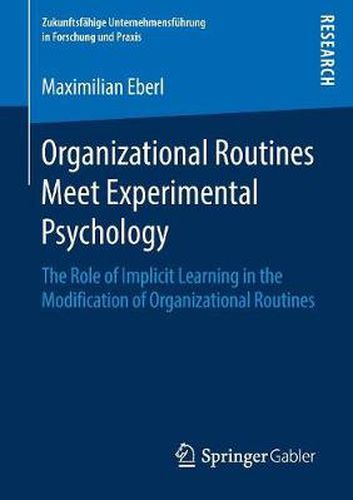Readings Newsletter
Become a Readings Member to make your shopping experience even easier.
Sign in or sign up for free!
You’re not far away from qualifying for FREE standard shipping within Australia
You’ve qualified for FREE standard shipping within Australia
The cart is loading…






This title is printed to order. This book may have been self-published. If so, we cannot guarantee the quality of the content. In the main most books will have gone through the editing process however some may not. We therefore suggest that you be aware of this before ordering this book. If in doubt check either the author or publisher’s details as we are unable to accept any returns unless they are faulty. Please contact us if you have any questions.
Using an experimental approach, Maximilian Eberl evaluates the role of implicit learning (CBM/AAT) for the modification of organizational routines. Taking a vertical perspective on the (collective) entities in organizations shows an increasing role of impulsive processes the lower the level gets. The horizontal perspective demonstrates the potential of implicit learning for the replication of routines. Finally, the time perspective highlights the contributions of implicit learning strategies for change in and of routines, as well as the contributions of implicit learning to deal with the path-dependence of routines.
$9.00 standard shipping within Australia
FREE standard shipping within Australia for orders over $100.00
Express & International shipping calculated at checkout
This title is printed to order. This book may have been self-published. If so, we cannot guarantee the quality of the content. In the main most books will have gone through the editing process however some may not. We therefore suggest that you be aware of this before ordering this book. If in doubt check either the author or publisher’s details as we are unable to accept any returns unless they are faulty. Please contact us if you have any questions.
Using an experimental approach, Maximilian Eberl evaluates the role of implicit learning (CBM/AAT) for the modification of organizational routines. Taking a vertical perspective on the (collective) entities in organizations shows an increasing role of impulsive processes the lower the level gets. The horizontal perspective demonstrates the potential of implicit learning for the replication of routines. Finally, the time perspective highlights the contributions of implicit learning strategies for change in and of routines, as well as the contributions of implicit learning to deal with the path-dependence of routines.